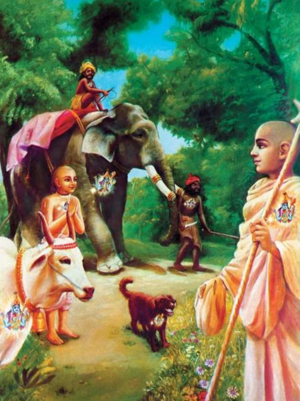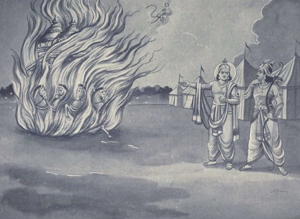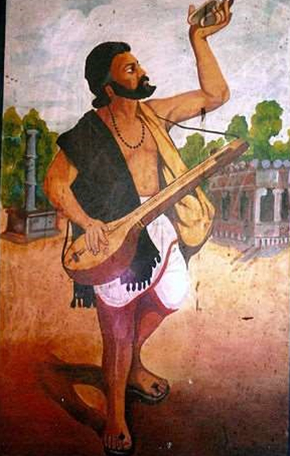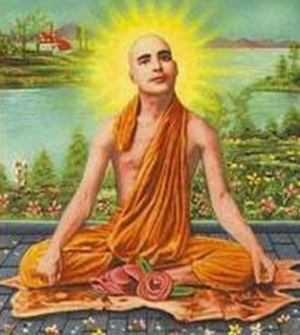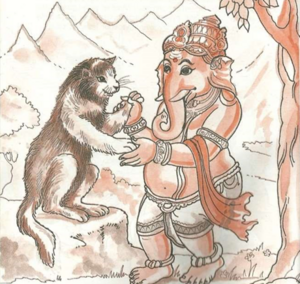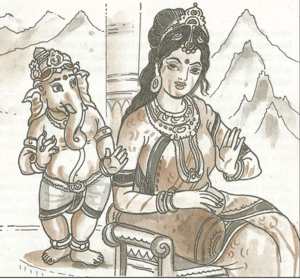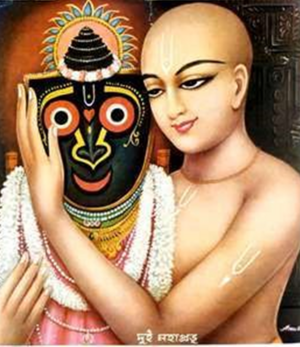Talk:Saguṇa Brahman as Antaryāmī:Attributes of Brahman as Antaryāmin
By Sri Vishal Agarwal
First, as the "Antaryāmī", Brahman gives an underlying unity to this entire creation and strings it together.
Second, Brahman also controls all creatures by being present inside their hearts:
"The ātmā, who resides within the hearts of all, is the ruler of all." — Yajurveda, Taittirīya Āraṇyaka 3.11.2
Kṛṣṇa said to Arjuna: "Īśvara resides in the hearts of all beings, causing them to turn around by His māyā (power or magic) as if they were mounted on a machine." — Gītā 18.61
Third, He is the true agent of all cosmic and bodily processes:
"By whom, willed and directed, does the mind shine light on its objects? By whom, commanded, does prāṇa show activity? At whose will do people utter words? And what Divine is it that prompts the eye and the ear? Because it is that (Brahman) which is the ear of the ear, the mind of the mind, the speech indeed of the speech, the breath of the breath, the eye of the eye – the wise, after giving up (wrong notions of their self-sufficiency) and after their death, become immortal." — Sāmaveda, Kena Upaniṣad 1.1–2
"The brilliance which emerges from the sun, illuminating the entire universe, which is in the moon and which is in the fire — know that brilliance to be Mine." — Gītā 15.12
"Permeating the earth, I support all beings with vitality, and having become the soma (moon) full of sap, I nourish all the plants." — Gītā 15.13
"Having become Vaiśvānara[1], residing within the bodies of all creatures, and combining with the prāṇa and apāna, I digest the four kinds of food." — Gītā 15.14
"And I am lodged within the hearts of all. From Me come memory and knowledge as well as their loss. I indeed am that which is to be known by all the Vedas. I am author (fulfiller) of the Vedānta and the knower of the Vedas." — Gītā 15.15
Illustration: The Main Switch vs. the Secondary Switch[2]
The central message of this attribute of the Divine can be understood with the help of a more contemporary example. Bhagavān is like the main power switch, whereas we are the small downstream switches. If the main switch is 'OFF', it does not matter whether the small switches are flipped to the 'ON' or the 'OFF' position. No electrical appliance will ever work if the main power switch is flipped to the 'OFF' position. Fortunately for us, Bhagavān is that main switch which is always 'ON', and for this reason, we often take His gifts and powers for granted.
Story: Kṛṣṇa as the Saviour of the Pāṇḍava-s
According to the rules of war, the Pāṇḍava-s and Kṛṣṇa went to the tents of the Kaurava army to spend the night there and take possession of the Kaurava treasury. This was meant to show the world that the Pāṇḍava-s now faced no danger from the Kaurava army and could even sleep without any fear in the Kaurava camp.
Story: Kṛṣṇa as the Saviour of the Pāṇḍava-s (continued)
When the chariot of Arjuna reached the Kaurava camp, Kṛṣṇa asked Arjuna to take his bow and other weapons, get off the chariot, and walk away to some distance. When Arjuna did this, Hanumān immediately flew off from the flag of the chariot and disappeared. Then, Kṛṣṇa got off and walked towards Arjuna. Immediately, the chariot burst into flames and exploded as the Pāṇḍava-s looked on in shock!
Yudhiṣṭhira asked Kṛṣṇa why this happened. Kṛṣṇa explained, "During the war, the chariot had been hit by many missiles and it should have exploded several days ago. But My presence kept it intact. Now the war is over, and we do not need it anymore. Therefore, I have allowed it to get destroyed."
Yudhiṣṭhira then bowed to Kṛṣṇa with respect and said, "We owe our victory to You, Kṛṣṇa. If You had not been there to look after us, we would have lost our lives a long time ago."
Fourth: Due to its Immanence, Brahman is the Witness (Sākṣī) of Our Good and Bad Karm
However, Brahman itself does not get tainted by the results of the good or bad karm of the doer. He is also therefore the Giver of the fruit of karm.
"I know the past and the present as also the future beings, but no one knows Me!" — Gītā 7.26
"The one Deva, hidden in all beings, all-pervading, the inner ātmā of all beings, the overseer of all karm, who dwells in all beings, the witness, the knower, the only one who is not tainted by the guṇa-s." — Yajurveda, Śvetāśvatara Upaniṣad 6.11
"The fruit of our karm comes from Brahman, because that possibility alone is the logical one." — Brahmasūtra 3.2.38
"The witness and permitter, sustainer, experiencer, the great Bhagavān, the Supreme Ātmā – thus is also called the Supreme Puruṣa inside this body." — Gītā 13.22
"Īśvara, the Dispenser, is the One who gives happiness and sorrows, and what is dear and what is not dear to all creatures on the basis of their past karmas. Īśvara indeed is the Master of everyone." — Mahābhārata 3.30.22
"Just as space is all-pervading, Īśvara too pervades all creatures (as a witness) and determines their measure of happiness and sorrows depending on their karmas." — Mahābhārata 3.30.24
Nothing is hidden from Bhagavān because He is all-pervading and present inside the entire creation — witness to everything that happens, even if we think it is a secret between two people. He ensures that everyone gets the just fruit of their karm.
Story: Bhagavān as the Witness for Sant Kanakadāsa (1509–1609 CE)
Kanakadāsa was a humble cowherd who wandered from village to village singing the praises of Bhagavān Viṣṇu. Vyāsatīrtha, a very famous scholar of Vedānta, took him as his student. Very soon, Kanakadāsa became his favorite student.
Story: Bhagavān as the Witness for Sant Kanakadāsa (continued)
The other students became jealous, because unlike them, Kanaka was not only from a very humble family, he was also not educated in scriptures. Vyāsatīrtha decided to teach his students a lesson. He called all of them and gave them a banana each, saying, “These are sacred bananas. If you eat them, you will be blessed. However, you must eat your banana in a secluded spot where no one can see you. Then come back and tell me where you had eaten your banana.”
After a day or so, everyone came back and reported that they had eaten their blessed banana at such and such spot. Surprisingly, Kanaka had still not eaten his banana. When Vyāsatīrtha asked, Kanaka responded, "Reverend teacher, I was not able to find a single spot where Bhagavān could not see me."
Vyāsatīrtha looked at his students and said, "For you, Bhagavān is merely something whose name is chanted by you in rituals. But for Kanakadāsa, Bhagavān is a real, living and breathing presence, whom he experiences everywhere."
Fifth: Brahman's Presence in the Heart Makes Meditation and Mokṣa Possible
This does not mean that Brahman is present only inside the hearts of all creatures, or that It is not present in creatures which do not have a heart. Kṛṣṇa clarifies:
Kṛṣṇa said to Arjuna: "I am the Soul seated in the hearts of all creatures. I am the beginning, the middle, and the very end of beings." — Gītā 10.20
The reason why the heart is emphasized as an abode of Brahman in the human body more than other parts is that it is especially fruitful to meditate upon Brahman by focusing on the heart region. In the state of deep meditation, the individual soul abides in the heart (*dahara-puṇḍarīka*) of the body. There, it is in very close communion with Brahman.
Sixth: All Living Beings Are the Abode of the Divine and Deserve Equal Respect
The presence of Brahman as Antaryāmī in the hearts of all creatures means that all living beings are the abode of the Divine and are worthy of our respect. He is impartial and present equally within all. The scriptures declare:
Kṛṣṇa said to Arjuna: "Sages see the same (Brahman) in a brāhmaṇa imbued with learning and humility, in a cow, an elephant, or even a dog or an outcaste." — Gītā 5.18
"I am the same Soul in all. None is hateful or dear to Me. But those who worship Me with devotion, they are in Me and I am also in them." — Gītā 9.29
"He who perceives the Supreme Bhagavān as abiding alike in all beings, not perishing when they perish — he, truly sees." — Gītā 13.27
"Because perceiving the same Bhagavān as established alike everywhere, he does not hurt the ātman by the ātman. Then, he attains the supreme goal." — Gītā 13.28
"None is dear to You, none inimical, none indifferent. These differences are only attributed to You by them whose vision is clouded by māyā." — Svayamprabhā in Adhyātma Rāmāyaṇa 4.6.71
Our suffering and status in society result from our own prior evil actions, not due to Divine prejudice. Irrespective of our gender, ethnicity, national origin, religion, etc., Bhagavān looks upon all of us equally. He showers His blessings on everyone, just as the sun casts its light on all creatures equally. There are no chosen people, no infidels, no high or low in His eyes.
Instead of focusing on superficial differences and treating people differently, we ought to focus on the common Divinity within all and treat everyone with love and respect. In fact, seeing the same Bhagavān within all creatures — ‘high’ or ‘low’ — is the true key to happiness and steadfastness in spirituality. The Gītā and the Upaniṣad-s declare this truth.
"He excels, who regards equally well-wisher, friend, enemy, neutral, mediators, despicable persons, and kinsmen, and even the virtuous and the evil." — Gītā 6.9
"He who is disciplined by yog sees his ātmā present in all beings, and all beings present in the ātmā – regarding all everywhere as the same." — Gītā 6.29
"He who sees Me everywhere, and sees all things in Me, I am not lost to him and he is not lost to Me." — Gītā 6.30
"The yogī who, established in Unity, worships Me as abiding in all beings, lives in Me in whatever way he otherwise acts." — Gītā 6.31
"Arjuna, he who sees equally everywhere, and regards all others as if they were his own ātmā, whether in pleasure or in pain, he is considered to be the perfect yogī." — Gītā 6.32
"That one, who is able to visualize the presence of ātmā in all other moving things and even creatures, and is able to visualize the presence of all such things within the ātmā, never gets angry and he never hates anything in life." — Īśāvāsya Upaniṣad 6
"When he has identified the unison between all the moving things (including creatures) and the ātmā, where is the question of him getting into delusion or sorrow?" — Īśāvāsya Upaniṣad 7
Story: Svāmī Rāmatīrtha (1873–1906 CE) Explains the Path to True Happiness[edit]
Svāmī Rāmatīrtha was born in the village of Murāriwālā in the district of Gujranwālā (in present-day Pakistan). From a very young age, he was deeply interested in reading and listening to Hindu holy books. As a young man, he became a mathematics teacher at a college in Lahore.
One day, he heard a speech of Svāmī Vivekānanda and was so inspired that he decided to become a sannyāsī himself.
During his travels in the United States (1902–1904), numerous Americans came to hear Svāmī Rāmatīrtha’s discourses on Vedānta – the teachings of the Upaniṣads.
One day, a lady came to see the Svāmī and wept in front of him. She said, "Ever since I have lost my only child, my son, my life has been full of darkness. I do not see any more hope in my life. I am seeking true peace and happiness. Can you help me find it?"
The Svāmī responded, "To get something as precious as peace and happiness, you will need to pay a price. If you agree to do so, I will come to your home tomorrow and show you how to obtain it." The lady agreed.
The following morning, Svāmī Rāmatīrtha knocked on the door of the lady’s home. When she opened the door, she saw that the Svāmī had come with an African-American child. The Svāmī said to her, "If you raise this child as your own son, and educate him and love him, you will get true peace and happiness."
In those days, it was very rare to see white Americans accept African-Americans as family members. The lady cringed and said, "Sir, how can a white woman accept a black child as her son?"
The Svāmī said, "If you cannot accept this child as your own, then you will find it very difficult to get true happiness and peace. There is unhappiness in this world because we discriminate against and look down upon others. Only when we accept as our own, and respect everyone whether they are black or white, will we get true peace."
The very gesture "Namaste" with which peoples greet others means "I bow to the Divine in you" and is an acknowledgement of the presence of Brahman in everyone. In the Bṛhadāraṇyaka Upaniṣad, Sage Yājñavalkya tells his wife Maitreyī that the only rational and true basis for loving everyone is the understanding that we are all united in Brahman, Who pervades us all.
In fact, as the Bhagavān is within everyone, how we treat others is how we treat Him. A delightful story illustrates this principle:
Story: Gaṇeśa Learns a Lesson from His Mother Pārvatī[edit]
It was a bright sunny day on Kailāśa. Gaṇeśa went out to play. He enjoyed looking at the butterflies and listened to the singing of birds. Suddenly, a cat walked to him.
Gaṇeśa was very pleased. He thought, "Let me become the cat’s teacher today." So he held the two front paws of the cat, and started dancing with it. After some time, Gaṇeśa said, "Now I will release your paws. I want you to continue standing on your two legs and dance with me." But as soon as he released the cat’s paws, it would sit down on all its four legs!
Gaṇeśa tried to make the cat dance on its two legs many times. But the cat just could not do it. Now Gaṇeśa became upset and said, "You are not being a good student. You will get some punishment for this." In anger, he scratched the face of the cat. The cat got scared and ran away immediately.
It was lunch time. Gaṇeśa went back to his home and asked his mother Pārvatī, "Mā, is lunch ready? I am hungry." Pārvatī replied, "Yes, food is ready, but let me put some bandage on my wounds first."
Gaṇeśa grew worried. He rushed in and said, "Who scratched you so badly on your face?" Pārvatī replied, "It was you of course!"
"You must be joking, Mā! How is that possible? I was playing out all the time. Someone else must have come in my place and pretended to be me. That person must have scratched your face."
Pārvatī replied, "My son Gaṇeśa, try to remember if you scratched anyone today?" Gaṇeśa became a little shy and said, "Yes, but it was a cat. What does the cat have to do with your scratches?"
Pārvatī said, "My son, I am the Mother of the whole Universe. I live in every creature, whether it is a plant, an animal, or a human being. Therefore, whenever you hurt anyone else, you actually hurt me."
Gaṇeśa learned his lesson. He realized that if we love others, we love Bhagavān. And if we trouble others, we are hurting Bhagavān. So, he promised to his mother, "I promise that from today onwards, I will never hurt others. I will never think bad about others. And I will never say bad things to others."
Pārvatī smiled and said, "You are right, my son. The best way to make Bhagavān happy is to love all creatures, because Bhagavān lives inside everyone’s heart."
Story: Bhagavān is Inside the Beautiful as well as the Ugly[edit]
It might be asked – does the all-pervading Bhagavān exist in evil and the ugly as well? The answer is "yes". In fact, what we think of as ugly might not be ugly in reality. This beautiful story teaches us to see Divinity in the so-called ugly things as well.
The King of Kaliṅga (present-day Odisha in India) constructed a grand temple to Jagannātha ("Bhagavān of the Universe", a form of Viṣṇu), but it had no Mūrti in it. The King made an announcement: "I want a sculptor to carve the most beautiful Mūrti of Viṣṇu. After the Mūrti is completed, I will inspect it. If I am pleased, the sculptor will be rewarded 10,000 gold coins. But if I am not happy with the work, the sculptor will be beheaded. I invite all skilled sculptors to come forward."
No sculptor wanted to risk his life, and so no one came forward. After several days, an old sculptor appeared, but with a condition: "I will need 30 days to carve the Mūrti. But during that period, I will work inside the Maṇḍira with the doors closed. No one is allowed to open the doors till the work is completed. If someone opens the door, I will leave the work unfinished."
The King, glad that someone had accepted the challenge, agreed. The sculptor entered the Maṇḍira and locked the doors behind him. For many days, sounds of hammer and chisel were heard from inside. But some ministers grew suspicious and said, "We believe this man is a spy of the enemy King. He must be damaging the pillars from inside."
Although the King ignored them initially, by the 21st day, he grew impatient. He ordered the doors to be opened.
When everyone entered the temple, they were shocked. An unfinished and seemingly ugly Mūrti of Viṣṇu lay on the floor, and the sculptor was still at work. The King, furious at what he saw, unsheathed his sword to behead the sculptor.
But the sculptor calmly said, "O King, you have broken your promise on the 21st day. I brought you through this experience to show you that Viṣṇu resides inside the entire creation — not just in beautiful Mūrtis, but also in those we perceive as ugly. Now, as per our agreement, I will leave this Mūrti unfinished. And I urge you to worship only this Mūrti in the temple. Let a beautiful one be carved for display elsewhere."
The King was stunned by the sculptor's courage, and ashamed of breaking his own word. But when he looked again at the sculptor, he was even more amazed — the sculptor now stood before him in the radiant, four-armed form of Bhagavān Viṣṇu.
The King had learned his lesson: that beauty and ugliness lie in the eye of the beholder. Bhagavān is present in all forms — even those we may wrongly dismiss as unworthy.

